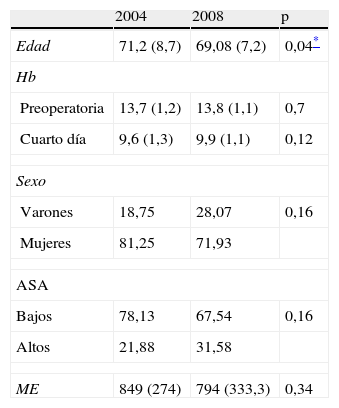Los equipos medicoquirúrgicos disponen de múltiples herramientas para reducir la necesidad de transfusión alogénica perioperatoria. En nuestro centro se ha generalizado el uso de recuperadores de sangre filtrada en el postoperatorio de la cirugía de prótesis total de rodilla desde 2006. El objetivo de este estudio fue evaluar si el uso de recuperadores de sangre filtrada disminuyó la tasa de transfusiones en nuestra práctica clínica habitual.
Material y métodosEstudio de cohortes retrospectivo: grupo 2004, pacientes intervenidos de prótesis total de rodilla durante 2004, antes del uso de recuperadores de sangre filtrada; y grupo 2008, pacientes intervenidos de prótesis total de rodilla durante 2008, usando recuperadores. Se registraron sexo, niveles de hemoglobina preoperatorio y al cuarto día, masa total eritrocitaria perdida, reinfusión de sangre recuperada y transfusión de banco durante la estancia hospitalaria.
ResultadosAmbos grupos fueron homogéneos en cuanto a sexo, hemoglobinas en el preoperatorio y el cuarto día, y masa total eritrocitaria perdida. La proporción de pacientes transfundidos fue significativamente menor en el grupo 2008 frente al grupo 2004 (20,18 vs. 42,19%), con un riesgo relativo de ser transfundido de 0,47 y NNT de 4,54; p=0,0017.
ConclusionesEn nuestro centro el uso de recuperadores disminuyó la proporción de pacientes transfundidos durante el ingreso para cirugía de prótesis total de rodilla, aunque este resultado no puede generalizarse debido a la ausencia de un criterio definido para indicar las transfusiones.
Surgical teams have several tools in order to reduce the need for postoperative allogenic transfusion. Postoperative autotransfusion of unwashed shed blood has become common practice for total knee replacement surgery since 2006 in our hospital. This study was designed to evaluate if this practice has reduced allogenic blood transfusions.
Material and methodsA retrospective study comparing two cohorts, group 2004 with patients operated on for total knee replacement during the year 2004, before the use of the retransfusion system, and group 2008, patients operated on in the year 2008, with regular use of the retransfusion system. Gender, preoperative and postoperative haemoglobin levels, total amount of calculated erythrocytes lost, reinfusion of shed blood and allogenic blood transfusion during hospital stay were recorded.
ResultsBoth groups were similar as regards gender, preoperative and postoperative hemoglobin levels, and total amount of erythrocytes lost. The proportion of transfused patients was significantly lower in group 2008 versus group 2004 (20.18% versus 42.19%), with a relative risk of being transfused of 0.47 and a NNT of 4.54. P=.0017.
ConclusionsIn our hospital the use of postoperative retransfusion systems has reduced the proportion of transfused patients during hospitalization for total knee replacement surgery, although this result cannot be generalized due to the lack of a fixed transfusion trigger.
Artículo
Comprando el artículo el PDF del mismo podrá ser descargado
Precio 19,34 €
Comprar ahora










